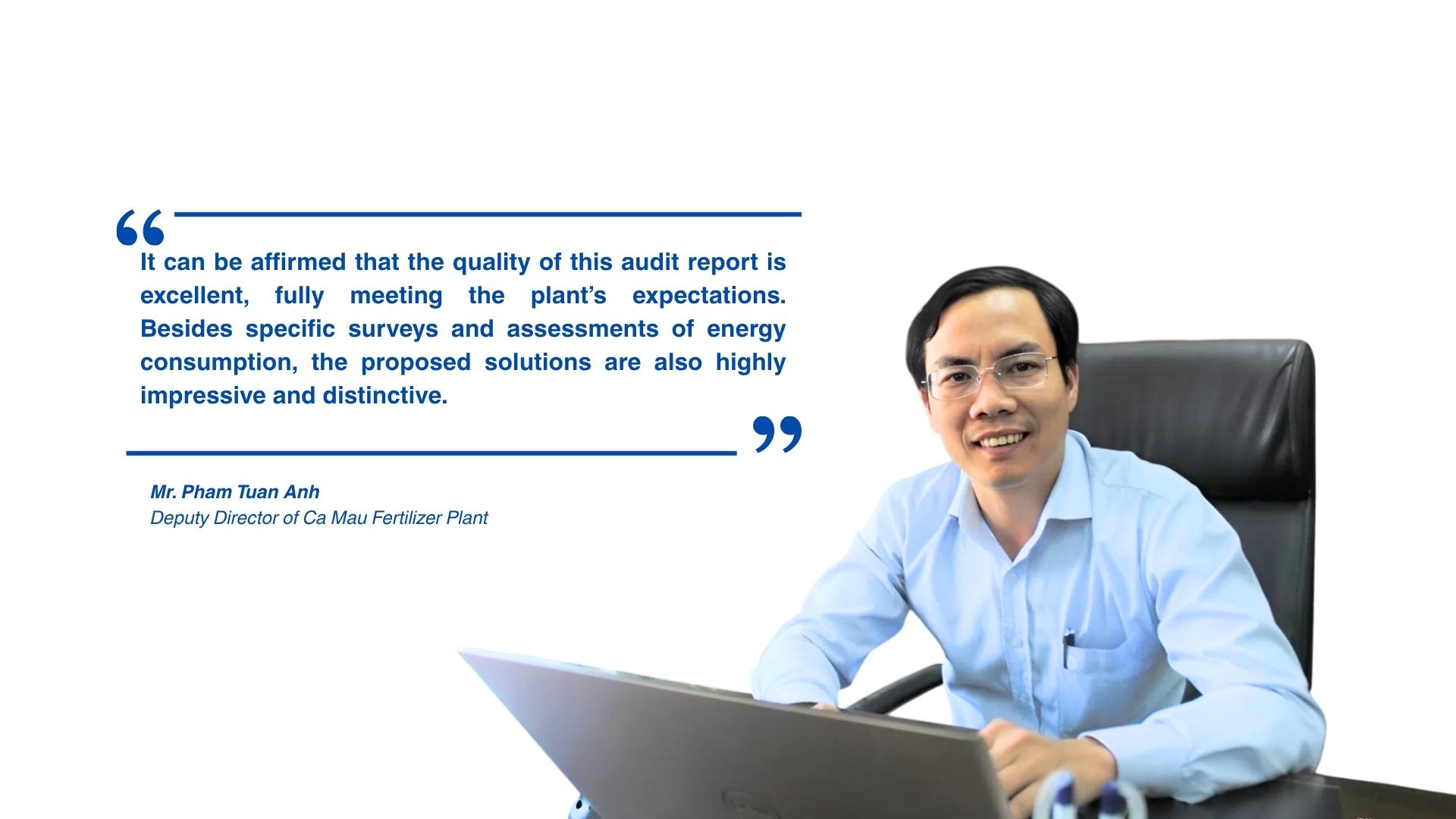Fertilizer production is one of the energy-intensive sectors. Fertilizer plants, especially those producing urea from natural gas, consume large amounts of electricity, steam, and gas in complex and continuous production processes. In the context of rising energy prices and the increasingly urgent requirement to reduce greenhouse gas emissions, fertilizer manufacturers have no choice but to optimize energy use.
As one of the enterprises participating in
the Voluntary Agreement Scheme on Energy Efficiency in Energy Intensive Industries (VAS Program) under the DEPP3 Program, PetroVietnam Ca Mau Fertilizer Joint Stock Company (PVCFC) has decided to leverage internal resources to further study the energy efficiency solutions proposed in the international standard energy audit report supported by DEPP3 experts. This decision demonstrates the company’s effort and confidence in pursuing green and sustainable development goals.
The
DEPP3 Program information page had an interview with Mr. Pham Tuan Anh, Deputy Director of Ca Mau Fertilizer Plant, to learn more about this journey.
Very pleased to meet you, Mr. Pham Tuan Anh! It is known that PVCFC has implemented many energy efficiency solutions and has been recognized as one of the most energy-efficient enterprises in the world. Could you please share how energy efficiency plays a role in enhancing the company’s competitiveness? How has PVCFC achieved this?
Mr. Pham Tuan Anh:
As a plant that consumes large amounts of gas and electricity as raw materials and fuel during production, which accounts for a significant portion of product costs, PVCFC clearly identifies that optimizing and saving energy, increasing capacity, and reducing losses are key goals that directly affect the company’s operational efficiency.
In 2024 alone, the cost of gas raw materials exceeded VND 4,400 billion, and electricity costs more than VND 220 billion, showing that reducing the consumption of raw materials and fuel is extremely important to us. To realize this goal, the company has simultaneously implemented several solutions, including:
(1) Enhancing the application of modern technology, technical improvements, and increasing equipment reliability;
(2) Building KPI systems and strictly controlling consumption norms;
(3) Promoting training and enhancing the professional capacity of the workforce;
(4) Closely coordinating with consulting units and highly specialized organizations to improve and optimize plant operations.
Among these, the partnership with DEPP3 has provided our company with many new, innovative, and highly professional perspectives, significantly contributing to the process of improving and enhancing energy use efficiency.
An efficiently operating plant like PVCFC also sees value in cooperating with DEPP3. What convinced the plant to join the Voluntary Agreement Scheme on Energy Efficiency (VAS Program)? What does PVCFC expect from this cooperation?
Mr. Pham Tuan Anh:
Through the introduction of the consulting firm - Bach Khoa Energy Conservation Joint Stock Company (ECC Bach Khoa), we had the opportunity to learn about this program. After working and exchanging with the parties involved, we realized the program offers a valuable opportunity for the company to collaborate with a team of highly qualified and experienced experts, especially with access to benchmarking data comparing our plant with similar plants worldwide. The effectiveness has been proven as many valuable findings and energy efficiency opportunities have been identified and are currently being studied for future implementation.
In your opinion, how is this audit different from previous audits?
Mr. Pham Tuan Anh:
What impressed us most was the outstanding quality of the DEPP3 expert team, who are experienced professionals with comprehensive data and working with professional and effective methods. I believe this is the key factor contributing to the success of the cooperation between PVCFC and DEPP3.
I can also confirm that this energy audit report is of very high quality, fully meeting the plant’s expectations. The objective perspectives in identifying areas for energy efficiency improvements are the prominent value we received from the DEPP3 Program.
Besides specific surveys and assessments of energy consumption, the proposed solutions also show clear differences and high practicality, bringing many tangible benefits to the enterprise.
DEPP3 Program experts participate in the energy audit at the plant.
What are the next steps after receiving the list of recommended solutions?
Mr. Pham Tuan Anh:
We are currently proactively researching and completing internal procedures to submit for leadership approval, while also developing a detailed plan and implementation roadmaps for each solution.
What role do fertilizer manufacturers like PVCFC play in promoting a greener future for the industry?
Mr. Pham Tuan Anh:
Statistically, alongside thermal power, cement, and steel industries, fertilizer production also ranks among the sectors with high energy consumption and significant greenhouse gas emissions. Facing urgent demands for green transition and emission reduction, leading enterprises like PVCFC have the responsibility to pioneer the application of science and technology, promoting green transition and reducing greenhouse gas emissions.
This not only contributes to realizing national commitments on emission reduction but also helps the company enhance production efficiency, optimize operating costs, and increase market competitiveness. At the same time, leading the transition process also creates a positive ripple effect, encouraging other enterprises in the industry to change, forming a sustainable and environmentally friendly fertilizer production value chain.
If there is an opportunity for future cooperation, what aspect would PVCFC like to receive support in to better meet its needs?
Mr. Pham Tuan Anh:
If possible, we expect DEPP3 to consider providing additional financial support, specifically partial funding for equipment investment, similar to how some international programs operate. Having this additional support would not only reduce our initial cost burden but also strongly motivate us to boldly invest in and apply advanced technologies and solutions, thereby enhancing energy use efficiency and increasing market competitiveness.
Thank you sincerely!
DEPP3 Program



.png)
.png)